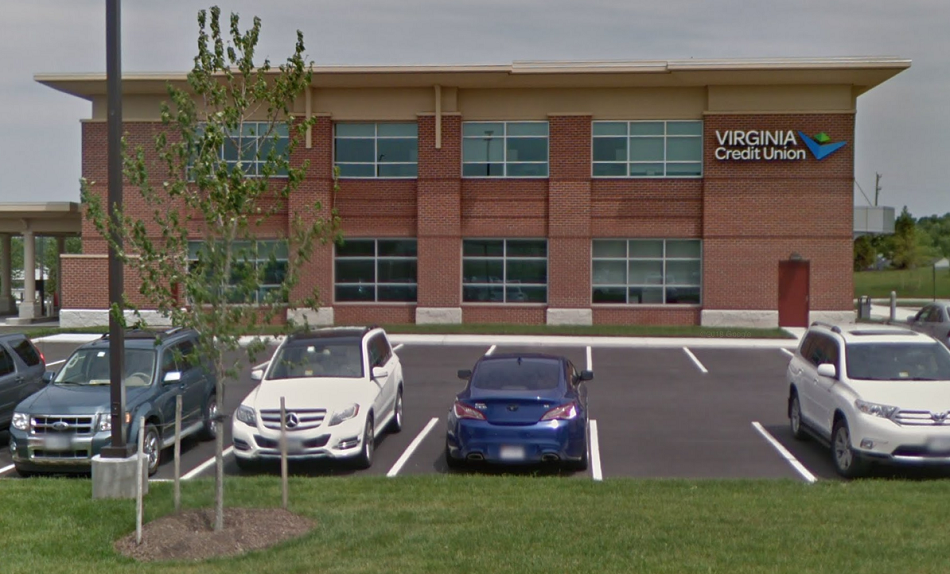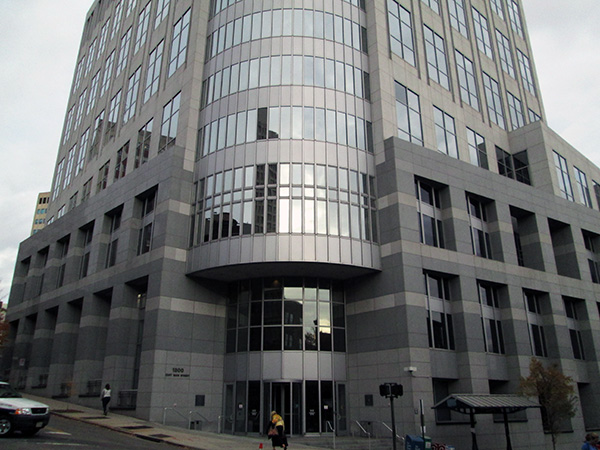
The Virginia Credit Union is engaged in a legal dispute over whether it can offer credit union membership to members of the Medical Society of Virginia. (BizSense file)
The battle over a proposed expansion of Richmond’s largest credit union continues, nearly three years and counting.
But the dispute waged by the Virginia Bankers Association and a group of banks against locally based Virginia Credit Union took a turn toward a potential resolution in recent weeks.
An examiner from the State Corporation Commission overseeing the matter recommended last month that VACU be found victorious in the case, which would allow it to offer credit union membership to all members of the Medical Society of Virginia.
While that expansion would simply give VACU the ability to try to win the business of MSV’s members, it’s the prospect of doing so that has drawn the ire of the bankers.
MSV’s ranks are 10,000 strong and made up mainly of physicians, a profession that’s often a coveted customer segment for banks.
At more than $4 billion in total assets and 300,000 members, VACU is the sort of not-for-profit credit union that banks say has grown too large and “bank-like,” though without the same tax burdens as their for-profit counterparts.
The dispute began in 2019, when VACU submitted an application to allow MSV into its field of membership. It was done at MSV’s request, documents state.
The VBA, joined by seven banks, filed a petition to block the expansion. They argued that VACU’s request goes too far beyond the statutory limit of membership expansion of 3,000 potential new members at a time. The MSV request is the largest such request ever by a credit union in Virginia, due to the size of the group and its statewide reach.
The banks signed on as petitioners with the VBA are Farmers Bank in Windsor, American National Bank & Trust in Danville, First Bank & Trust in Abingdon, First National Bank in Altavista, Chesapeake Bank in Kilmarnock, The Bank of Charlotte County and Blue Ridge Bank. Chesapeake Bank, First Bank and Blue Ridge Bank each has a presence in the Richmond market.
VACU’s application was initially approved by Bureau of Financial Institutions Commissioner Joe Face. However, the bankers’ petition has left the matter on hold ever since.
All sides have since litigated the case, which slogged on through the pandemic and was restarted at the request of SCC commissioners last year.
Among the main arguments has been whether MSV has the ability to create a credit union of its own, which industry-specific groups have often done in the past.
The bankers group argued that Virginia law calls for groups of 3,000 or more to create their own credit union. VACU and its camp has said that should only be done when a credit union can be formed reasonably within the standards of safety and soundness expected of regulated credit unions.
The record identifies eight groups in excess of 3,000 members that were permitted to join the FOM of an existing state-chartered credit union in Virginia since 2003.
“I find the statutory provisions underlying this case require the exercise of judgment that goes beyond whether MSV could form a new credit union, to whether MSV should form a new credit union,” the examiner stated.
The case has gone to such lengths as having both sides analyze how much startup capital is needed to form a new credit union in the modern age — $3.5 million — and whether MSV could reach that figure on its own.
The case also has considered the state of small credit unions, many of which have struggled in recent years to stay afloat in the face of rising costs and regulatory burdens.
The number of credit unions in Virginia, according to the documents filed in the case, has declined from a peak of 408 in 1979, to 114 as of the end of 2020. No new state-chartered credit unions have been formed in Virginia since 1983.
“Thus, I find that a new MSV credit union is unlikely to succeed on an ongoing basis,” the hearing commissioner concluded in his recommendation for approval of the expansion. “Furthermore, based on the level of donated capital required to form a new MSV credit union, coupled with the unlikelihood of success, I find that MSV could not feasibly or reasonably establish a new credit union.”
With the recommendation on the record, the case is now at a likely crescendo. Next up in the process is a window for all parties involved to submit comments. That will be followed by a likely decision by SCC commissioners. They’ll either rule in favor of VACU, against it or send the case back for further consideration.
Should the commissioners find in favor of VACU, the bankers could still appeal the ruling up the Supreme Court of Virginia.
VACU and the bankers group declined comment for this story.
The MSV did not respond to a request for comment.

The Virginia Credit Union is engaged in a legal dispute over whether it can offer credit union membership to members of the Medical Society of Virginia. (BizSense file)
The battle over a proposed expansion of Richmond’s largest credit union continues, nearly three years and counting.
But the dispute waged by the Virginia Bankers Association and a group of banks against locally based Virginia Credit Union took a turn toward a potential resolution in recent weeks.
An examiner from the State Corporation Commission overseeing the matter recommended last month that VACU be found victorious in the case, which would allow it to offer credit union membership to all members of the Medical Society of Virginia.
While that expansion would simply give VACU the ability to try to win the business of MSV’s members, it’s the prospect of doing so that has drawn the ire of the bankers.
MSV’s ranks are 10,000 strong and made up mainly of physicians, a profession that’s often a coveted customer segment for banks.
At more than $4 billion in total assets and 300,000 members, VACU is the sort of not-for-profit credit union that banks say has grown too large and “bank-like,” though without the same tax burdens as their for-profit counterparts.
The dispute began in 2019, when VACU submitted an application to allow MSV into its field of membership. It was done at MSV’s request, documents state.
The VBA, joined by seven banks, filed a petition to block the expansion. They argued that VACU’s request goes too far beyond the statutory limit of membership expansion of 3,000 potential new members at a time. The MSV request is the largest such request ever by a credit union in Virginia, due to the size of the group and its statewide reach.
The banks signed on as petitioners with the VBA are Farmers Bank in Windsor, American National Bank & Trust in Danville, First Bank & Trust in Abingdon, First National Bank in Altavista, Chesapeake Bank in Kilmarnock, The Bank of Charlotte County and Blue Ridge Bank. Chesapeake Bank, First Bank and Blue Ridge Bank each has a presence in the Richmond market.
VACU’s application was initially approved by Bureau of Financial Institutions Commissioner Joe Face. However, the bankers’ petition has left the matter on hold ever since.
All sides have since litigated the case, which slogged on through the pandemic and was restarted at the request of SCC commissioners last year.
Among the main arguments has been whether MSV has the ability to create a credit union of its own, which industry-specific groups have often done in the past.
The bankers group argued that Virginia law calls for groups of 3,000 or more to create their own credit union. VACU and its camp has said that should only be done when a credit union can be formed reasonably within the standards of safety and soundness expected of regulated credit unions.
The record identifies eight groups in excess of 3,000 members that were permitted to join the FOM of an existing state-chartered credit union in Virginia since 2003.
“I find the statutory provisions underlying this case require the exercise of judgment that goes beyond whether MSV could form a new credit union, to whether MSV should form a new credit union,” the examiner stated.
The case has gone to such lengths as having both sides analyze how much startup capital is needed to form a new credit union in the modern age — $3.5 million — and whether MSV could reach that figure on its own.
The case also has considered the state of small credit unions, many of which have struggled in recent years to stay afloat in the face of rising costs and regulatory burdens.
The number of credit unions in Virginia, according to the documents filed in the case, has declined from a peak of 408 in 1979, to 114 as of the end of 2020. No new state-chartered credit unions have been formed in Virginia since 1983.
“Thus, I find that a new MSV credit union is unlikely to succeed on an ongoing basis,” the hearing commissioner concluded in his recommendation for approval of the expansion. “Furthermore, based on the level of donated capital required to form a new MSV credit union, coupled with the unlikelihood of success, I find that MSV could not feasibly or reasonably establish a new credit union.”
With the recommendation on the record, the case is now at a likely crescendo. Next up in the process is a window for all parties involved to submit comments. That will be followed by a likely decision by SCC commissioners. They’ll either rule in favor of VACU, against it or send the case back for further consideration.
Should the commissioners find in favor of VACU, the bankers could still appeal the ruling up the Supreme Court of Virginia.
VACU and the bankers group declined comment for this story.
The MSV did not respond to a request for comment.



